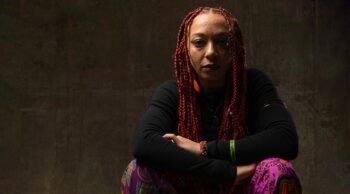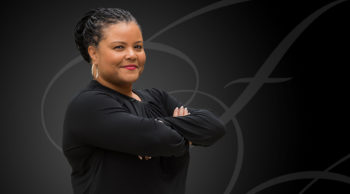Everyone who attended the Black History Month opening celebration at CSUDH in early February was struck by the passion and energy of the woman who kicked off the proceedings. As she recited two poems and performed an original song, it was clear that Africana Studies Adjunct Professor Meryah Fisher had a palpable connection to the students in attendance, who enthusiastically cheered and danced along. Such connections are by design. A large part of Fisher's teaching is formulated to center her students as people before delving into the coursework. “We start out every single day with the question 'How are you?',” she says. “I didn't even bother going over the syllabus during the first week ... Read More
Africana Studies
Donna Nicol Wins 2021 Excellence in Service Award
Donna Nicol, associate professor and department chair of Africana Studies, has a personal connection to CSUDH. “I grew up nearby, and my mother went to Dominguez Hills,” says Nicol. “My first job out of college was also at CSUDH. It's been a staple in my life.” Nicol says that after working for a decade as an assistant/associate professor in women's and gender studies at CSU Fullerton, getting the position at CSUDH “felt like I was coming home.” Nicol has been a vibrant, vocal presence on campus since her return. Her work helping to revive the Africana Studies department, spirited support of ethnic studies efforts, and efforts co-chairing the CSUDH Anti-Racism Task Force have helped ... Read More
Faculty Highlights: March 2021
Our faculty members participate in conferences around the world, conduct groundbreaking research, and publish books and journal papers that contribute to their field and highlight their expertise. We feature those accomplishments and more in this section. To share faculty news, email ucpa@csudh.edu. College Arts and Humanities Nancy Erbe, professor of Negotiation, Conflict Resolution and Peacebuilding (NCRP), co-edited the book “Preventing and Reducing Violence in Schools and Society,” a collection of innovative research on the evolution and implementation of nonviolence concepts within social settings in order to prevent oppression and violence among global communities. The book explores ... Read More
Watch Party and Discussion: ‘The Big Picture: A Race for America’
The Africana Studies Department is hosting a Zoom watch party and discussion of “The Big Picture: A Race for America,” an Al Jazeera English documentary focused on private funding from foundations and its impact on Black lives through the pandemic, social protests, and politics. The film includes Donna Nicol, associate professor and chair of Africana Studies, who served as an expert panelist during the film. The documentary originally aired as a two-part series earlier this month. The watch party takes place Feb. 23 from 4:30 to 6:30 p.m. Join the conversation on Zoom: ID number 840 1223 7375; passcode 007732. ... Read More
Faculty Highlights: September 2020
Our faculty members participate in conferences around the world, conduct groundbreaking research, and publish books and journal papers that contribute to their field and highlight their expertise. We feature those accomplishments and more in this section. To share faculty news, email ucpa@csudh.edu. College of Arts and Humanities Alice Nicholas, lecturer of Africana Studies, published the book “Reflections of an Africologist: 10 Million Stories," (volume 9) in August. Nicholas has written numerous books from the "10 Million Stories" series, a collection she created in 1999. In August, Salim Faraji, professor of Africana Studies, presented ... Read More



